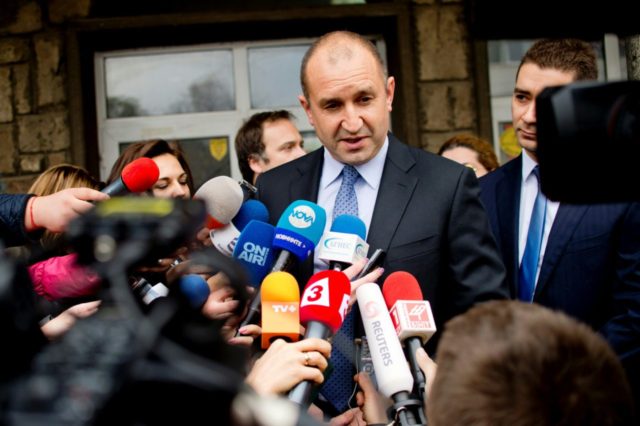SOFIA, (Reuters) – Bulgarians vote in a runoff presidential election on Sunday and are expected to choose a Russia-friendly former air force commander – Rumen Radev – possibly paving the way for months of political uncertainty.
A newcomer to politics, Radev campaigned on strong anti-migrant rhetoric and an argument that it was in the country’s national interest to find a balance between the requirements of its European Union membership and better ties with Russia.
“Until recently I flew on a Soviet jet fighter. I have graduated from a U.S. academy. But I am a Bulgarian general. My cause is Bulgaria,” Radev said ahead of Sunday’s contest for the largely ceremonial post that pits him against the ruling GERB party’s candidate, parliament speaker Tsetska Tsacheva.
The latest opinion polls showed 53-year-old Radev, backed by the opposition Socialists, about 10 percentage points ahead of Tsacheva, 58, after his unexpected victory in last Sunday’s first round ballot.
Radev has benefited from discontent with the centre-right government of Prime Minister Boiko Borisov over his perceived failure to make significant progress in rooting out corruption, as well as slow public sector reforms.
“There is no power which can force me to vote for GERB after all their lies,” said 68-year-old Veska Kenarova after casting her ballot in the Sofia district of Mladost. “It is high time for a change.”
Borisov has vowed to step down if Radev wins on Sunday, a move likely to swing the country back to political instability and prompt snap polls probably in the spring, which could further delay reforms and spook investors.
While most of the country’s decisions lay with the government, the president, who leads the armed forces, can sway public opinion and has the power to send legislation back to parliament.
DIVIDED LOYALTIES
Radev’s anti-migrant and pro-Russia rhetoric has resonated with a public disheartened with European Union membership, as the bloc focuses on fighting internal battles and dealing with Britain’s decision to leave.
Radev is not advocating NATO member Bulgaria abandon its Western alliances, mindful of the financial impact of EU aid and the country’s long history of divided loyalties.
But he has called for an end to EU sanctions against Russia and said Sofia should be pragmatic in its approach to any international law violations by Moscow when it annexed Crimea.
“People are concerned about what his agenda really is as he is sending contradictory messages. Radev is softer on Russia, at least in part to meet the Russophile sentiment among some of the electorate, but yet I think he is 100 percent pro-NATO,” a Western diplomat in Sofia told Reuters, speaking on condition of anonymity.
Many in the Balkan country are keen to see restored trade with their former Soviet overload, hurt by economic problems and sanctions, and to protect vital tourism revenues.
Although Bulgaria’s economy is expected to grow at a relatively healthy rate of about 3.1-3.3 percent this year, having shaken off recession in the wake of the global financial crisis, it remains the EU’s poorest member, with average wages about 470 euros per month.
Rampant graft in public administration is seen as a key factor slowing the small Black Sea state’s progress in catching up with its wealthier EU peers.
Opinion polls published on Thursday showed Radev winning 49.6-51 percent of the runoff vote for the largely ceremonial post against parliament speaker Tsacheva’s 39.1-40 percent. Because voting is compulsory in Bulgaria, voters can choose neither candidate.
Voting started at 7.00 a.m. (0500 GMT) and polls close at 8.00 p.m.
Editing by Helen Popper and Stephen Coates

COMMENTS
Please let us know if you're having issues with commenting.